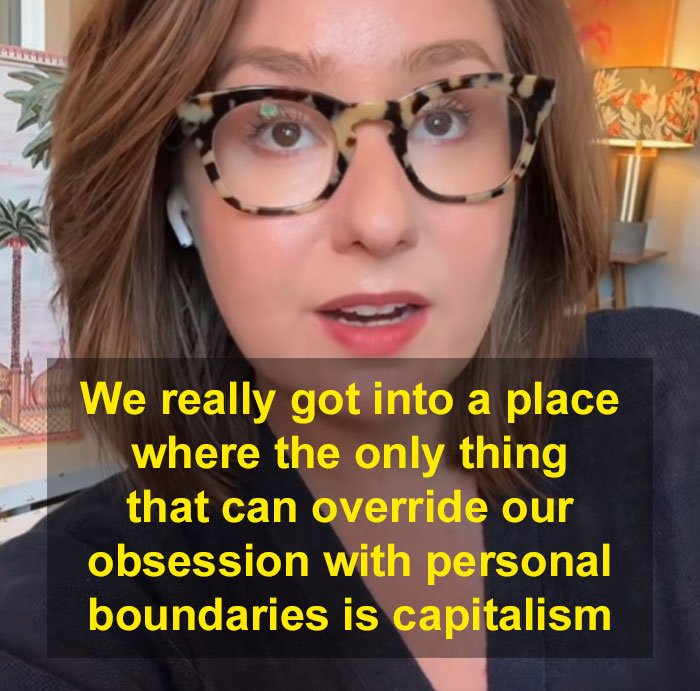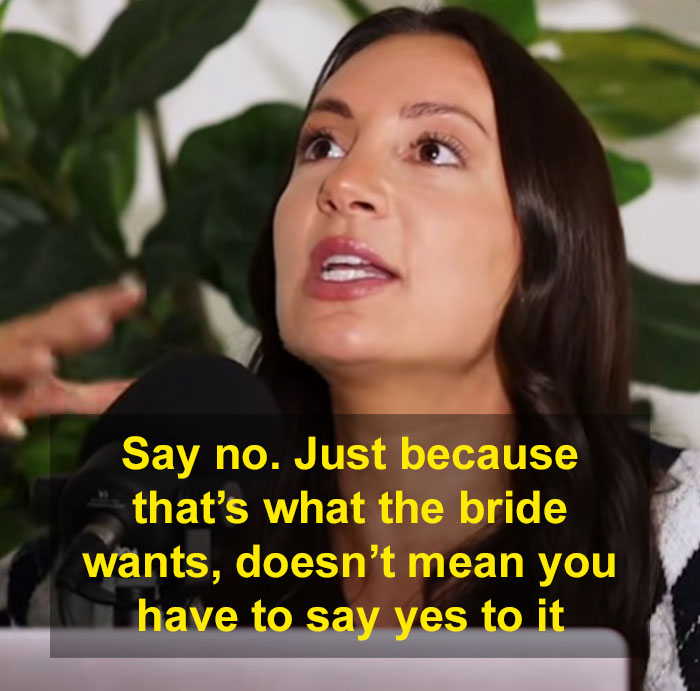The online space is full of discourse about setting boundaries for better mental well-being. However, for many people, it’s still difficult to figure out how to establish them and when’s the right time to do it.
Author and co-founder of The Financial Diet Chelsea Fagan raised this issue on TikTok by reacting to one woman struggling to say ‘No’ to her best friend’s elaborate bachelorette party, which was going to cost thousands and put her into debt. In the video, Fagan questions why it’s so hard to set boundaries when it comes to money and calls for action to do better.
Scroll down to find the full bachelorette story, Fagan’s response, and conversation with relationship consultants and boundary experts Jan Yuhas, MA, MFT and Jillian Yuhas, MA, MFT, and licensed marriage and family therapist Rachel Astarte, who kindly agreed to discuss more about what people get wrong about boundaries.
The discussion about boundaries was ignited by this story of a woman struggling to say ‘No’ to an elaborate bachelorette party
Image credits: giveittomestraight




Image credits: Curated Lifestyle / unsplash (not the actual photo)



Image credits: giveittomestraight
You can find the full story in a video format here:
@giveittomestraight Need to start taking out loans for these bachelorette parties #giveittomestraightpodcast ♬ original sound – Give It To Me Straight
Commenters couldn’t believe the audacity of the bride for wanting such a costly bachelorette










Reacting to the story, Chelsea Fagan started a discussion about boundaries

Image credits: faganchelsea




Image credits: Zan Lazarevic / unsplash (not the actual photo)


Image credits: faganchelsea
You can find the full video of Chelsea talking about boundaries here:
@faganchelsea #stitch with @Give It To Me Straight ♬ original sound – faganchelsea
“The primary misunderstanding about boundaries is that they are solely for protecting the person who creates them”

Image credits: Meg Aghamyan / unsplash (not the actual photo)
Continuing the discussion on the complex concept of boundaries and what people get wrong about them, experts say that people often forget that they aren’t solely there to protect the person who creates them and instead require mutual understanding and communication.
“The primary misunderstanding about boundaries is that they are solely for protecting the person who creates them. In reality, we create boundaries in order to develop better relationships. To put it simply, life is interactive. Relational,” explains licensed marriage and family therapist Rachel Astarte.
“Therefore, if we want our boundaries to be honored, we must consider the other person. We ultimately want a better, safer, more productive, and authentic self—we also want that in our relationship with the other person. That’s what makes a boundary healthy. Boundaries help us to learn each other better and clear the way for effective, meaningful, and authentic interaction,” she explains.
“Many people have come to believe that ultimatums are the same as relationship boundaries, but this couldn’t be further from the truth. In reality, healthy boundaries in relationships require mutual understanding and open dialogue,” second relationship consultants and boundary experts Jan Yuhas, MA, MFT and Jillian Yuhas, MA, MFT.
“Too often, individuals set ultimatums based solely on their personal limits, assume that a boundary is understood without discussing, or expect the other person to comply without offering space for collaboration. While one-sided demands can
be necessary in situations where safety is threatened, they’re not effective for navigating everyday disconnects in relationships.”
Boundaries are meant to protect a person’s peace and energy so they can effectively interact with others

Image credits: Chroki Chi / unsplash (not the actual photo)
While there are many types of boundaries, like emotional, physical, sexual, intellectual, time/commitment, family, work, digital, couple, material, etc., they all are meant to protect a person’s peace and energy so that they can interact with others more effectively, says Astarte.
A boundary should be set when personal space and energy are infringed. If that’s the case, the person should decide what they need or want to do to remedy that infringement and be clear, calm, and unwavering in their language. “Know it’s okay to say no, stand firm in your boundary with no pressure to justify it, and create space between you and the other person if your boundary is not honored,” advises Astarte. “Boundaries allow us to be at our best, most present selves when interacting with others. Here’s the boundaries mantra I teach my clients and students: My boundaries benefit both of us.”
“Every aspect of our lives can be shaped by specific boundaries that protect our self-worth while simultaneously maintaining mutual respect in our relationships. Personal boundaries might include things like going to the gym daily or leaving work by a set time, whereas relationship boundaries serve as a communication channel to bridge the gap between two perspectives and are grounded in shared values that strengthen the connection,” Jan and Jillian further explain.
“In romantic, familial, platonic, or professional relationships, boundaries may look like mutually beneficial agreements around the frequency of communication, financial contributions, or clearly defined roles and responsibilities to ensure a project is completed on time.”
If a person wrongly sets a boundary, they risk hindering their relationships with people around them

Image credits: Timur Repin / unsplash (not the actual photo)
If a person wrongly sets a boundary, like, for example, failing to think about the other person when doing it, they risk hindering their relationships with people around them. “Rather than deepen the connection, it often leads to increased disconnection, and in some cases, the dissolution of the relationship, loss of employment or clients, or strained personal and professional ties. Ultimatums, one-sided demands, or threats tend to breed distrust, resentment, and emotional distance,” Jan and Jillian say.
“Ironically, this is usually the opposite of what the person intends. Most people set boundaries because they want to preserve and strengthen a connection, not end it. True boundaries are rooted in respect and mutual understanding, not control.”
To avoid these consequences and set healthy boundaries instead, people should follow such guidelines, suggested by Astarte:
Internally:
• Know why you are creating the boundary
• Imagine what it would be like without that boundary
• Consider the effects of not having the boundary
• Stay grounded in yourself (Drop into your body; feel your feet.)
• Use this helpful boundary mantra: “My boundaries benefit both of us.”
Externally:
• Choose the right time.
• Speak clearly and calmly.
• Keep yourself grounded as you speak (Breathe!).
• Use I-statements/caring + loving language.
People in the comments had various opinions on the topic



















